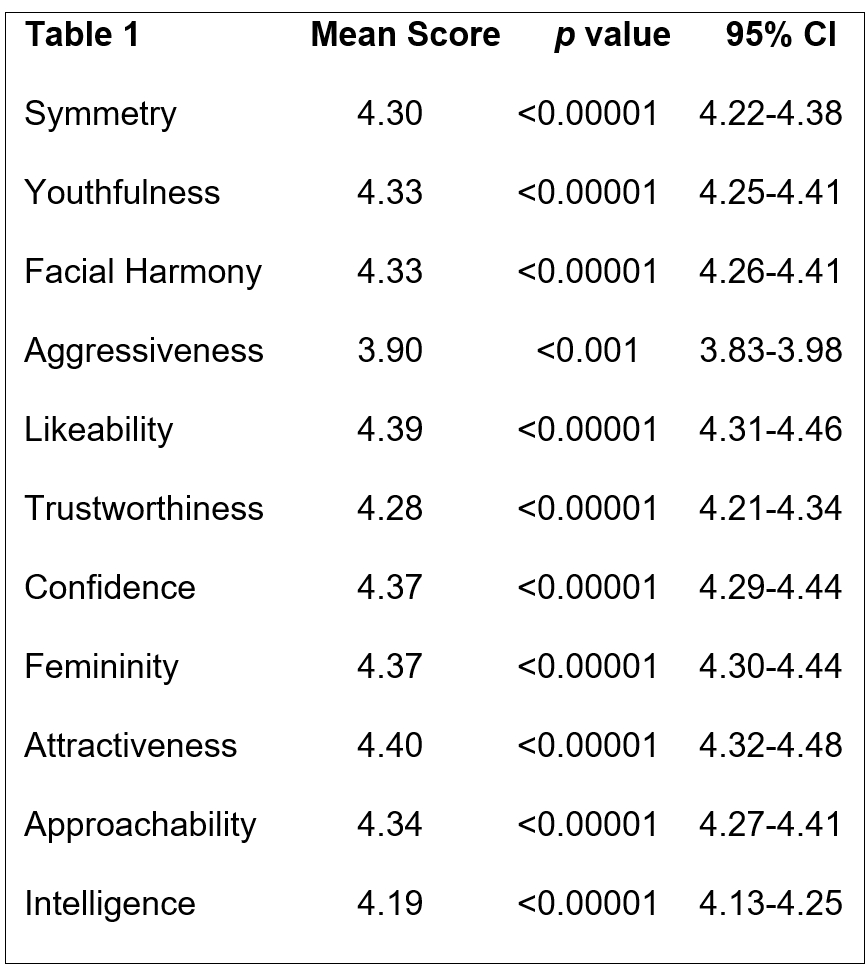The Public Face of Rhinoplasty: Impact on Perceived Attractiveness and Personality
Stephen M. Lu, M.D., M.Div1, David T. Hsu, PhD2, Adam Perry, MD1, Lyle Leipziger, MD1, Armen K. Kasabian, MD1, Scott P. Bartlett, MD3, Charles H. Thorne, MD1, Neil Tanna, MD, MBA1.
1Northwell Health, Hofstra-Northwell School of Medicine, Lake Success, NY, USA, 2Stony Brook Medicine, Stony Brook, NY, USA, 3Children's Hospital of Philadelphia, Philadelphia, PA, USA.
BACKGROUND:
The impact of aesthetic rhinoplasty has been studied from the perspective of the surgeon and the patient, but not from that of the general public. The authors assess the impact of rhinoplasty on public perception of a patient's appearance and personality. Methods: A survey was created using standardized before and after photographs of ten Caucasian women who had undergone primary rhinoplasty. Photos of two additional women who had not undergone facial surgery were randomly included as controls, for a total of twelve survey items. Pre- and post-operative frontal and lateral photographs were placed side by side. To eliminate left/right bias, half of the items had pre-operative photos on the left, and half had post-operative photos on the left. The survey was administered via crowd-sourcing, which has been validated as a way to evaluate aesthetic outcomes. Respondents were na´ve to the study purpose and were asked to evaluate which photo better represented 11 traits of appearance or personality, according to a seven-point Likert scale. A score of 1 meant the pre-operative photo was much better, 7 meant the post-operative photo was much better, and 4 meant no difference. Using a distributed online survey platform, unique anonymous respondents were recruited, excluding those under age 18 or diagnosed with schizophrenia or autism. Demographics and survey responses were recorded. T-tests and ANOVAs evaluated changes in ratings for each trait and differences between demographic groups. P <.01 was considered statistically significant. Results: 264 responses were received. Averaged scores across the 10 survey patients produced a value for each appearance or personality trait. In 10 of 11 categories (symmetry, youthfulness, facial harmony, likeability, trustworthiness, confidence, femininity, attractiveness, approachability, and intelligence), the post-operative photo was significantly favorable compared to the preoperative photo (p<.00001) (Table 1). The pre-operative photo was rated higher only in aggressiveness (p<.001). The same scores were calculated for the controls; no statistically significant difference in any category was seen except confidence, where the right image was viewed as more confident (mean 4.19, p<.005). No significant difference was seen across gender or age groups. Conclusions: Aesthetic rhinoplasty improves the public perception of a person's appearance and personality in multiple aspects. Small but significant and clear differences were observed and held consistently across demographic groups. 
Back to 2017 Program




